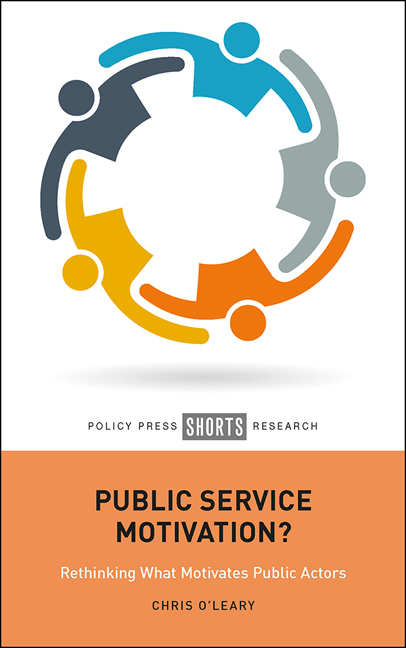two - Conceptualising public service motivation
Published online by Cambridge University Press: 12 October 2022
Summary
Introduction
In the 30 years since Perry and Wise (1990) first formalised public service motivation, it has become a dominant concept in public administration. Theoretical and empirical research has grown significantly, with hundreds of articles being published in each of the last few years. Indeed, Gene A Brewer recently suggested that public service motivation research has become a cottage industry, and is one of the ‘hottest topics’ in public administration research (Brewer, 2019).
This puts public administration scholarship at odds with wider political science, where rational choice theory has been described as being the dominant paradigm. More importantly, the near hegemonic status of public service motivation in the public administration scholarship raises significant questions about how the concept is defined and understood. Some of these questions have been raised elsewhere, from both within and outside the PSMT community. In this chapter, I explore how the concept has developed over the past 30 years, and some of the current fault lines in how it is understood. In doing so, I argue that it is not a coherent concept; it is not clearly differentiated from other similar ideas, and there are still significant areas of debate around the scope of public service motivation. I am not the first to make such arguments, nor am I alone in arguing that more theoretical work needs to be done before we can hope to understand what the empirical results really mean. But there are several areas of this debate to which this book hopefully contributes.
Public service motivation theory as a middle-range theory
PSMT is not intended to be a complete theory of human social action. It is a middle-range theory, intended to provide specific and testable hypotheses, linking empirical evidence and theory building in practical ways in relation to specific situations or contexts. Indeed, this is one of the undoubted strengths of PSMT. Rather than focusing on endless grand, or post hoc theorising (Green and Shapiro, 1995), PSMT provides concrete and real propositions that could and should make a real-world difference.
PSMT is focused on predispositions and motivations of individuals engaging in public institutions.
- Type
- Chapter
- Information
- Public Service Motivation?Rethinking What Motivates Public Actors, pp. 25 - 50Publisher: Bristol University PressPrint publication year: 2022

